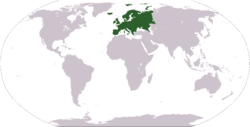Definify.com
Definition 2026
Europa
Europa
English
Proper noun
Europa
- (Greek mythology) A Phoenician princess abducted to Crete by Zeus.
- (astronomy) A moon of Jupiter.
- (astronomy) Short for 52 Europa, a main belt asteroid; not to be confused with the Jovian moon.
Derived terms
Translations
Catalan
Proper noun
Europa f
See also
- (continents) continent; Àfrica, Antàrtida, Àsia, Oceania, Europa, Amèrica del Nord/Nord-amèrica, Amèrica del Sud/Sud-amèrica (Category: ca:Continents) [edit]
Dutch
Pronunciation
- IPA(key): /øːˈroːpaː/, [øˑˈroːpaˑ], [ʏˑˈroːpaˑ]
Proper noun
Europa n
Europa f
Galician
Pronunciation
Proper noun
Europa
- Europe
- (astronomy) Europa (large moon of Jupiter)
- (astronomy) Europa (asteroid)
- (Greek mythology) Europa (woman seduced by Zeus)
Related terms
Coordinate terms
- (continents) continente; África, América, Antártida, Asia, Oceanía, Europa, Norteamérica/América del Norte, Sudamérica/Suramérica/América del Sur (Category: es:Continents)
- (moon of Jupiter): Calisto, Ganímedes, Ío
German
Pronunciation
- IPA(key): /ɔʏ̯ˈʁoːpa/
Proper noun
Europa n (genitive Europas, no plural) Europa f (genitive Europa, no plural)
- (neuter) The continent Europe
- Deutschland liegt im Herzen Europas.
- Germany lies in the heart of Europe.
- Deutschland liegt im Herzen Europas.
- (feminine) (Greek mythology) A Phoenician princess abducted to Crete by Zeus
- (feminine) A moon of Jupiter
Related terms
Ido
Etymology
Borrowing from English Europe, French Europe, German Europa, Italian Europa, Russian Евро́па (Jevrópa), Spanish Europa, ultimately from Latin Eurōpa, from Ancient Greek Εὐρώπη (Eurṓpē).
Pronunciation
- IPA(key): /ew.ˈro.pa/, /ɛw.ˈɾɔ.pa/
Proper noun
Europa
Derived terms
- Europana (“European”)
- Europano (“European”)
See also
- (continents) kontinento; Afrika, Antarktika, Azia, Australia, Europa, Nord-Amerika, Sud-Amerika (Category: io:Continents)
Italian
Pronunciation
- IPA(key): /euˈrɔpa/, [eu̯ˈrɔː.pa]
- Hyphenation: Eu‧rò‧pa
Proper noun
Europa f
Related terms
- Europa centrale
- Europa meridionale
- Europa occidentale
- Europa orientale
- Europa settentrionale
- europeo
- euro
- euro-
- eurasiatico
- eurocentristico
- eurocentrismo
- eurocity
- eurocomunismo
- eurocrate
- eurodeputato
- eurodivisa
- eurodollaro
- euromercato
- euromoneta
- europarlamento
- europeismo
- europeista
- europeizzare
- europio
- europoide
- euroscudo
- eurosocialismo
- eurovisione
See also
- (continents) continente; Africa, America meridionale, America settentrionale, Antartide, Asia, Europa, Oceania (Category: it:Continents)
Latin
Etymology
From Ancient Greek Εὐρώπα (Eurṓpa), a character in Greek mythology.
Pronunciation
- (Classical) IPA(key): /euˈroː.pa/
Proper noun
Eurōpa f (genitive Eurōpae); first declension
Inflection
First declension, with locative.
| Case | Singular |
|---|---|
| nominative | Eurōpa |
| genitive | Eurōpae |
| dative | Eurōpae |
| accusative | Eurōpam |
| ablative | Eurōpā |
| vocative | Eurōpa |
| locative | Eurōpae |
Related terms
Descendants
- → Bulgarian: Европа (Evropa)
- Catalan: Europa
- → English: Europa, Europe
- → Korean: 유럽 (Yureop)
- → Dutch: Europa
- French: Europe
- → German: Europa
- Italian: Europa
- → Mandarin: 歐羅巴
- Portuguese: Europa
- → Japanese: ヨーロッパ (Yōroppa)
- Romanian: Europa
- Spanish: Europa
- → Russian: Европа (Jevropa)
References
- Europa in Charlton T. Lewis and Charles Short (1879) A Latin Dictionary, Oxford: Clarendon Press
- Europa in The Perseus Project (1999) Perseus Encyclopedia
- Europa in Harry Thurston Peck, editor (1898) Harper's Dictionary of Classical Antiquities, New York: Harper & Brothers
- Europa in William Smith, editor (1848) A Dictionary of Greek Biography and Mythology, London: John Murray
- Europa in William Smith., editor (1854, 1857) A Dictionary of Greek and Roman Geography, volume 1 & 2, London: Walton and Maberly
Lithuanian

Proper noun
Europa f
- Europe (continent)
Declension
Related terms
- europietis m, europietė f
This Lithuanian entry was created from the translations listed at Europe. It may be less reliable than other entries, and may be missing parts of speech or additional senses. Please also see Europa in the Lithuanian Wiktionary. This notice will be removed when the entry is checked. (more information) July 2010
Norwegian
Etymology
From Latin Europa, from Greek.
Proper noun
Europa
- Europe (continent)
- Hun kan alle hovedstedene i Europa. (Bokmål)
- Ho kan alle hovudstadene i Europa. (Nynorsk)
- She can name all the capitals in Europe.
Derived terms
- Europakommisjonen
- Europaparlamentet
- Europarådet
- europamester (Bokmål), europameister (Nynorsk)
See also
- europeisk
- europeer (Bokmål), europear (Nynorsk)
- europakart
- Vest-Europa
- Sentral-Europa
- Nord-Europa (Bokmål), Nord-Europa (Nynorsk)
- Øst-Europa (Bokmål), Aust-Europa (both)
- (continents) kontinent; Afrika, Antarktis, Asia, Australia, Europa, Nord-Amerika, Sør-Amerika (Category: no:Continents)
References
- “Europa” in The Ordnett Dictionary
- Online Etymology Dictionary entry on "European"
Polish
Pronunciation
- IPA(key): /ɛwˈrɔpa/
Proper noun
Europa f
Declension
| singular | |
|---|---|
| nominative | Europa |
| genitive | Europy |
| dative | Europie |
| accusative | Europę |
| instrumental | Europą |
| locative | Europie |
| vocative | Europo |
Derived terms
Portuguese
Pronunciation
- (Brazil) IPA(key): /ew.ˈɾɔ.pɐ/
Proper noun
Europa f
- Europe (a continent)
- (Greek mythology) Europa (Phoenician princess)
- (astronomy) Europa (moon of Jupiter)
Quotations
For usage examples of this term, see Citations:Europa.
Related terms
|
Romanian
Pronunciation
- IPA(key): /e.uˈro.pa/
Proper noun
Europa f
Declension
| singular | ||
|---|---|---|
| f gender | indefinite articulation | definite articulation |
| nominative/accusative | (o) Europă | Europa |
| genitive/dative | (unei) Europe | Europei |
| vocative | Europă, Europo | |
Related terms
Serbo-Croatian
Alternative forms
- Evrópa (Bosnian, Serbian)
Pronunciation
- IPA(key): /eurǒːpa/
- Hyphenation: E‧u‧ro‧pa
Proper noun
Európa f (Cyrillic spelling Еуро́па)
Declension
| singular | |
|---|---|
| nominative | Europa |
| genitive | Europe |
| dative | Europi |
| accusative | Europu |
| vocative | Europo |
| locative | Europi |
| instrumental | Europom |
Spanish
Proper noun
Europa f
- Europe
- (astronomy) Europa (large moon of Jupiter)
- (astronomy) Europa (asteroid)
- (Greek mythology) Europa (woman seduced by Zeus)
Related terms
See also
- (continents) continente; África, América, Antártida, Asia, Oceanía, Europa, Norteamérica/América del Norte, Sudamérica/Suramérica/América del Sur (Category: es:Continents)